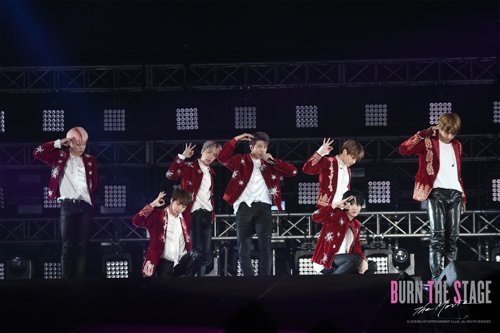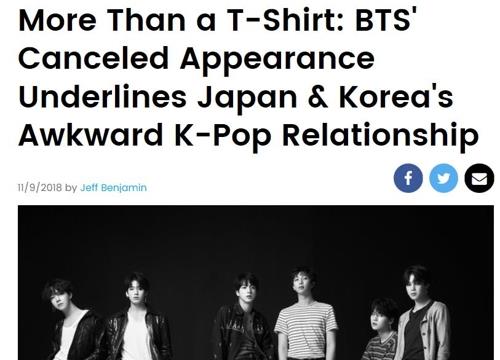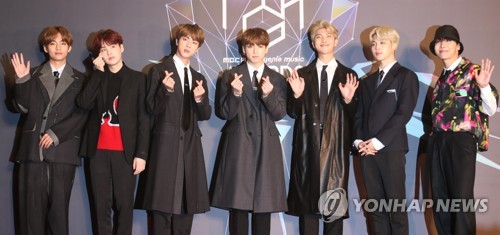


Japan TV Asahi 'Music Station' on the surface of the cancellation reason for the so-called 'Korean Liberation Army' T-shirt that member Jimin wore in the past. However, the domestic and foreign interpretations that the political conflict and cultural Hegemony checks are included behind it have led to The Butterfly Effect, in which the bilateral relations are highlighted.
In addition, the music industry is a simple example of BTS's global influence, but it has closely watched the impact on the third Korean wave in Japan as it voiced criticism from domestic and political parties and became a hot 'dispute' of the two countries.
"It seems to have been targeted for extreme right-wing forces for political and cultural reasons"
Jimin's T-shirt, which was questioned by Japan Broadcasting Corporation, was exposed for several seconds in the documentary "Burn the Stage" which was released on YouTube last year. The shirt contains patriotism, our history, liberation, and Korean language, along with a picture of mushroom clouds with atomic bombs, and pictures of people calling for the Korean Liberation Army. This shirt was made by a company to announce the Korean Liberation Army, which regained the country after the Japanese colonial rule, and to make young people interested in our history. Jimin was reportedly presented by a fan.
When the United States of America CNN and the BBC expressed it as an "Amber Thrower Shirt", SNS quickly spread the hashtag "#LiberationTshirtNotBomBTShirt" (Korean Liberation Army T-shirt, not amber T-shirt) to inform fans about the meaning of the T-shirt production. In addition, the contents of fans who looked into Japan's colonial history of Korea were also posted.
The problem is when Japan took issue with this T-shirt. Some interpreted that BTS, which achieved the first place in the Billboard, became a target of the forces against the Japan far-right media as the relationship between the two countries became uncomfortable due to conflicts over the comfort women agreement during the Park Geun-hye administration and the Korean Supreme Court of South Korea's Japan corporate liability ruling on victims of forced labor.
The United States of America popular music media Billboard said in an article on the 9th (local time) that the T-shirt was a late issue and said, "We are rooted in long political and cultural issues between countries." The actual BTS also appeared on TV Asahi's Music Station Super Live 2017 in December last year.
In addition, there is a view that Japan's check is due to the transfer of Hegemony of Asian pop culture to Korea. While J-pop has been a long decline in the World market, K-pop has attracted attention as a World content thanks to BTS's performance. In Japan, BTS and TWICE are rekindling K-pop popularity and are driving the third Korean wave.
Billboard introduced the expansion of K-pop in Japan and said, "Japan struggled to balance the popularity of Korean artists."
Ha Jae-geun, a popular culture critic, said, "As K-pop Korean wave has recently revived in Japan, Japan's extreme right-wing forces have a sense of checking Korean wave, and the complaints about the Korean Supreme Court of South Korea have increased, and the World group BTS has become a target of sniper."
Influence on the third Korean wave ?.."YouTube era, no major disruption" vs. "Diplomatic conflict shrinks"
The Korean wave boom in Japan has been greatly influenced by political factors such as Liancourt Rocks and history textbooks. Following the first Korean wave towed by the drama, TVXQ, Big Bang, Girls' Generation and Kara, the second Korean wave, suffered a cooling of the relationship between the two countries due to the visit of former President Lee Myung-bak to Liancourt Rocks in 2012. Korean wave content has disappeared as well as the appearance of Korean singer in Japan broadcast, and the voice of the annoyance has also increased as the relationship between the two countries has become estranged. Then, NHK 'Hongbaek Gapjeon', which is broadcasted every December 31, has been on the list for five consecutive years since 2012.
The music industry, which has experienced this experience, has focused on the impact of this incident on the third Korean wave. Many of them could be hit by broadcast appearances, but they did not expect to shrink in other activities such as concerts. As the YouTube era has become more popular, K-pop has continued to be popular online even in previous cooling machines.
"It is an example of the influence of BTS," said a director of overseas business at a company. "Although the Japanese government may have problems with broadcasting appearances in the future, K-pop and other Korean wave contents are already consumed on YouTube and various SNS, "He said.
BTS also left the country on October 10 for the 'Love Your Self' Japan Dome Tour, which will start at the Tokyo Dome on March 13-14. Earlier on the 7th, Japan's ninth single, "Fake Love/Airplane Part.2" (FAKE LOVE/Airplane pt.2), was ranked # 1 on the Oricon Daily Singles Chart with its highest score.
TWICE, which has stepped on the top of the Oricon chart several times, will also go on a dome tour of Tokyo Dome, Nagoya Dome and Osaka Kyocera Dome for the first time as a K-pop girl group next year. Aizuwon, a Korean-Japanese joint girl group formed through Mnet 'Produce 48', won the Oricon weekly album chart and weekly digital album chart with debut album released at the end of last month.
However, there is a voice of concern that the Korean wave will shrink if the diplomatic conflicts between the two countries intensify, and the domestic political parties are voiced. In China, Korea's Sad deployment has led to the so-called Han Han-ryong in earnest since July 2016, and there has been experience of exporting Korean content and entertainer activities. Most overseas entry groups are still highly dependent on the Japanese market.
"If the perception that the Japan far-right group can attack sensitively when casting a Korean wave star becomes difficult to tolerate Korean wave star activity in Japan, and it can not be ruled out that it will lead to a contraction of Korean wave," said Ha Jae-keun.
Interpretation of political conflict and cultural Hegemony checks on the cancellation of the appearance of the broadcasters, attention to the influence of the third Korean wave in Japan